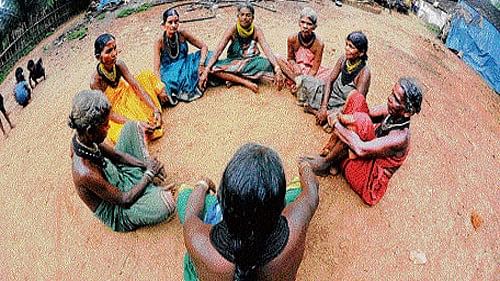
Representative image for Scheduled Tribes
DH File Photo
Scheduled Tribes (STs) in India form roughly 8.6% of the total population, forming one of the most vulnerable groups in the country. As forest dwellers, they have sustained their livelihoods by integrating traditional knowledge with the available regional forest and natural resources. Among the STs, some tribes are more vulnerable and marginalised than others due to poor economic progress and low health and education indices.
These tribes are termed Particularly Vulnerable Tribal Groups (PVTGs). Currently, there are 75 PVTGs among more than 730 STs in India, characterised by declining population levels, primitive technology use, extremely low literacy levels, and subsistence-level economies.
One such PVTG is the Kotwalia tribe inhabiting the southern region of Gujarat, primarily the districts of Bharuch, Surat, Navsari, Valsad, and Dang. The Kotwalia tribe is also known as ‘Vitolia’ or ‘’Vansfodia’—literally meaning the one who breaks (fodia) bamboo (vans), signifying their traditional means of livelihood. Their traditional craft involves working with bamboo, a practice they continue today. Kotwalias have traditionally inhabited forest regions to ensure a regular supply of bamboo, which they use to make various household articles such as bags, containers, brooms, and baskets to sell and earn a living. They used to have no trouble harvesting bamboo from the jungle.
However, over time, the management of forest products came under the jurisdiction of the forest department, requiring Kotwalias to obtain permission from divisional forest officers. Furthermore, rising global warming, climate change, and anthropogenic activities in forest areas have weakened and disrupted the availability and accessibility of bamboo. Changes in precipitation patterns and temperature affect bamboo growth, while the worsening impacts of climate change degrade the forest cover and the availability of natural resources. The Kotwalia tribe, lacking economic stability and political voice, struggles to adapt to these changing conditions and build livelihood resilience. Their sole dependency on bamboo-based livelihoods has forced many of them to work as labourers in nearby agricultural and sugarcane fields, leading to severe economic deprivation and livelihood vulnerability.
To address these challenges, it is crucial to build a sustainable livelihood system and promote livelihood resilience among the Kotwalia tribal community through science-based technological interventions. First, sustainable bamboo management practices should be incorporated to ensure the long-term availability of bamboo in the region, using technology to implement responsible harvesting techniques and pest management.
Second, capacity building and upskilling Kotwalia youth with the necessary technological skills to enhance bamboo cultivation and product development can mitigate existing vulnerabilities.
Ensuring quality checks for bamboo items can help address the challenge of obtaining fair pricing for their goods and access to international markets. By ensuring a robust framework for quality checks, the bamboo goods produced by Kotwalias can be better priced and positioned to compete with other goods. Better pricing will ensure increased incomes for the community.
Fourth, technological interventions to diversify their livelihoods will reduce their dependence on bamboo and allow for more than just one stream of income.
Fifth, within their traditional means of livelihood, modern tools and techniques can be taught and adopted by the tribal youth to make their processes more effective and efficient. Kotwalias use their traditional knowledge of the natural resources to sustain their livelihoods, and their traditional knowledge needs to be preserved.
At the same time, integrating scientific interventions with their traditional knowledge will further enhance their age-old art of making bamboo goods, prevent it from becoming redundant, and strengthen the processes without losing their original value. Building logistics support for transporting their goods, awarding GI tags to the items, and creating better market linkages will ensure fair product pricing.
Beyond scientific and technological interventions, policy support is crucial to protecting the Kotwalias against declining income streams and climate change vulnerabilities. It is imperative to foster more robust legal and policy frameworks to protect the rights and resources of vulnerable tribal communities. Advocating for supportive government policies that promote secure land tenure, sustainable practices, and fair market conditions will improve the situation of marginalised communities. Further, ensuring access to climate-resilient infrastructure, such as natural water storage systems, and enhancing community health systems to cope with climate-induced health risks are necessary to reduce the risks and vulnerability of the tribal groups in modern times and facilitate just transition and inclusive growth of the country.
(Anand Madhukar is Assistant Professor and Programme Coordinator (Climate Science & Policy) at TERI School of Advanced Studies, New Delhi. Ananya Mohan works as an associate consultant at STENUM Asia. The views expressed are personal and solely those of the writers and do not necessarily reflect those of the writers' organisations.)